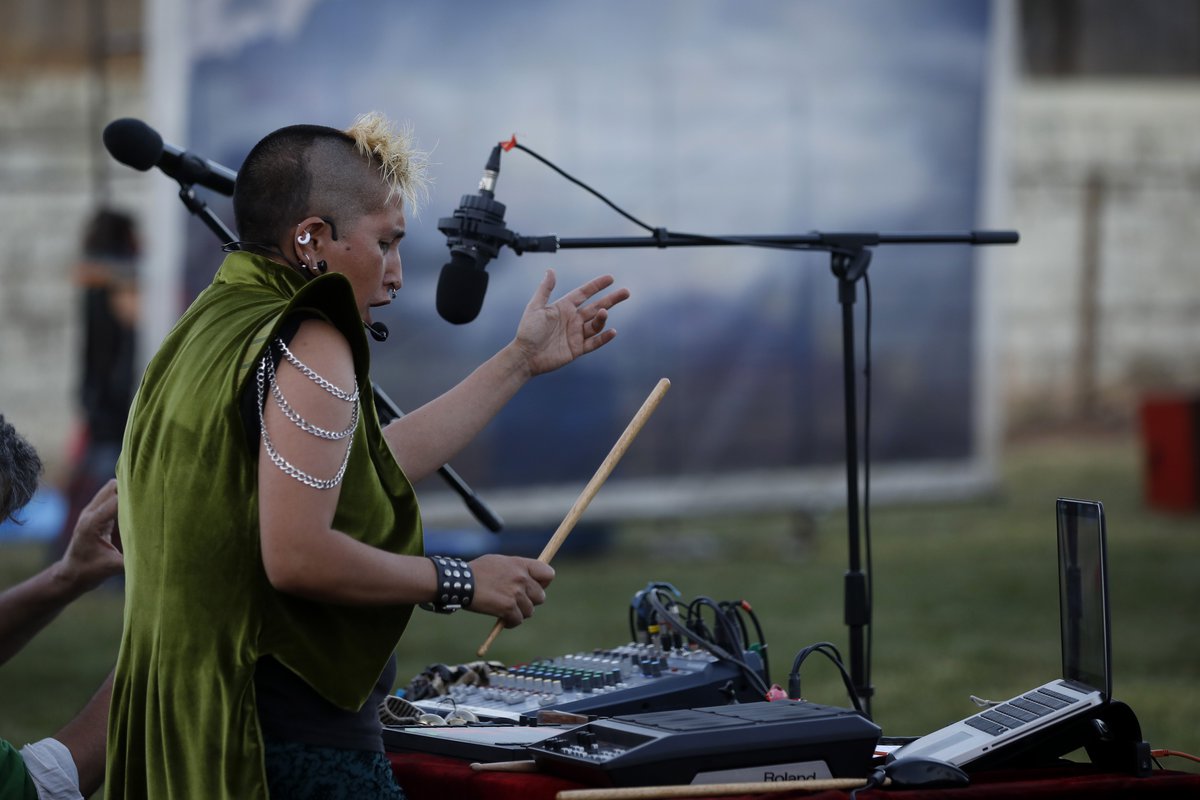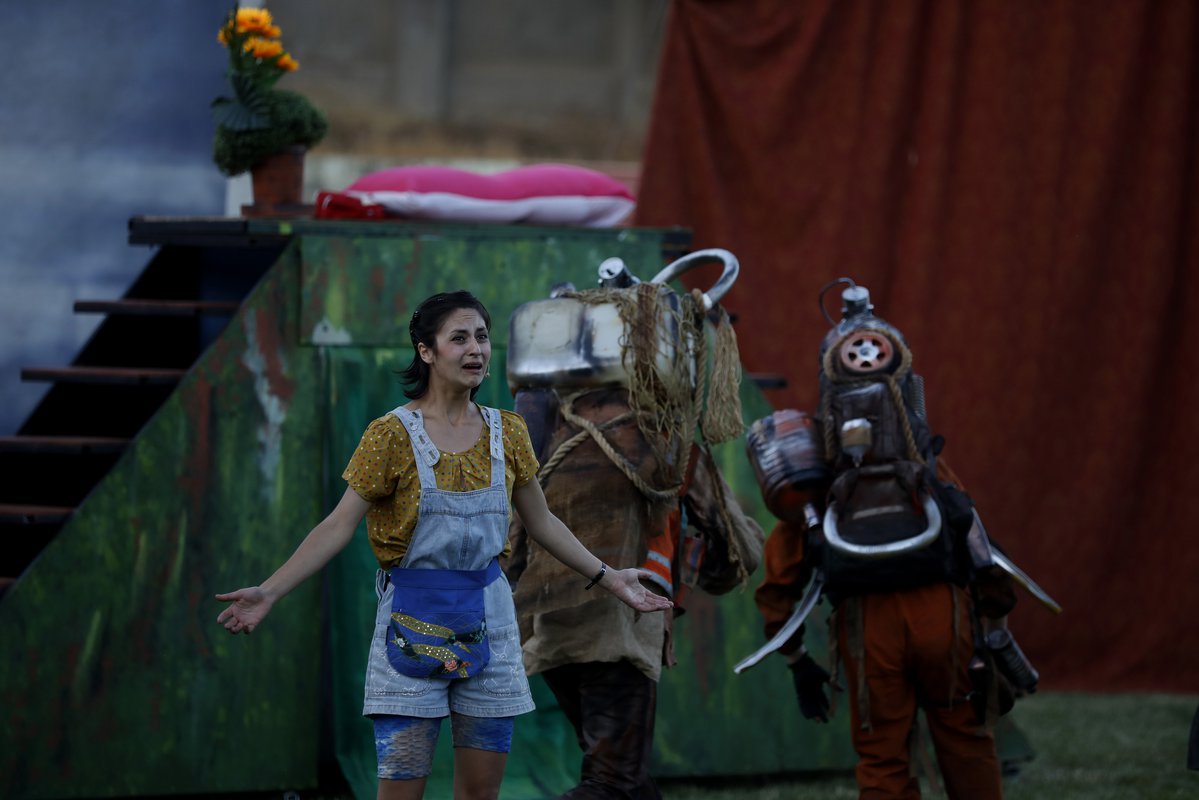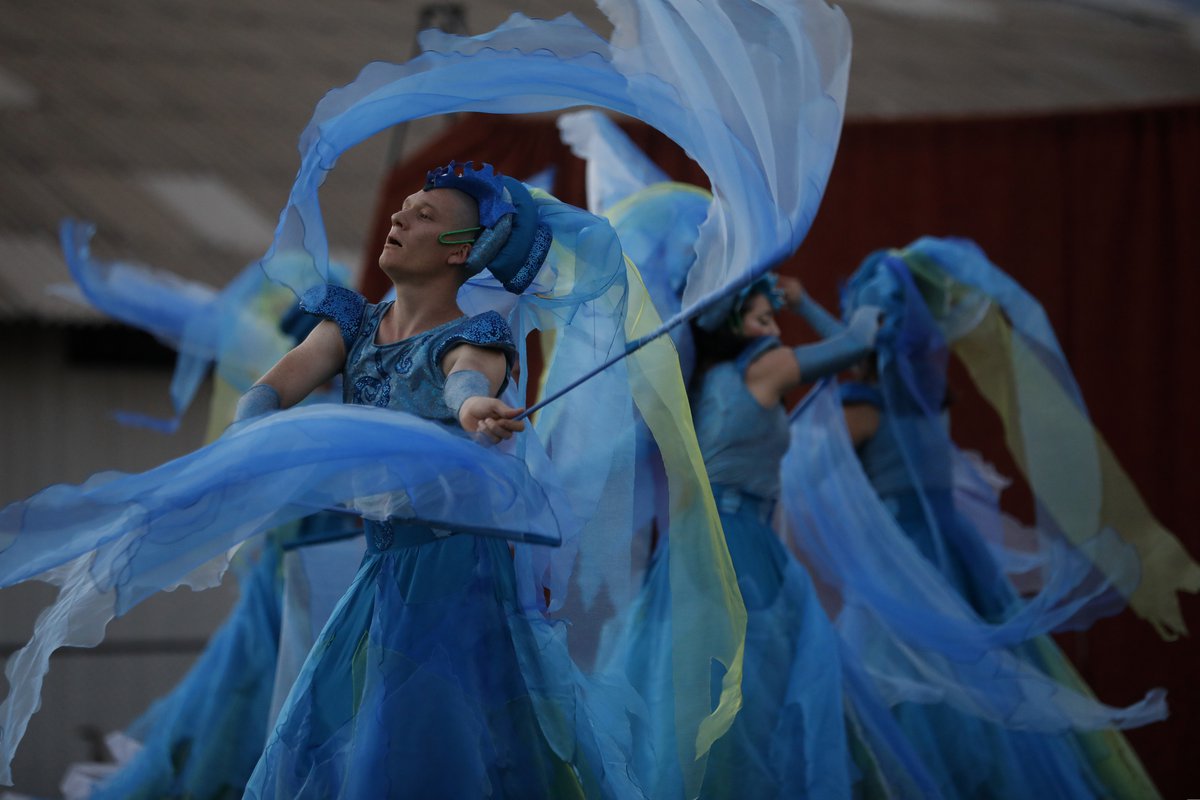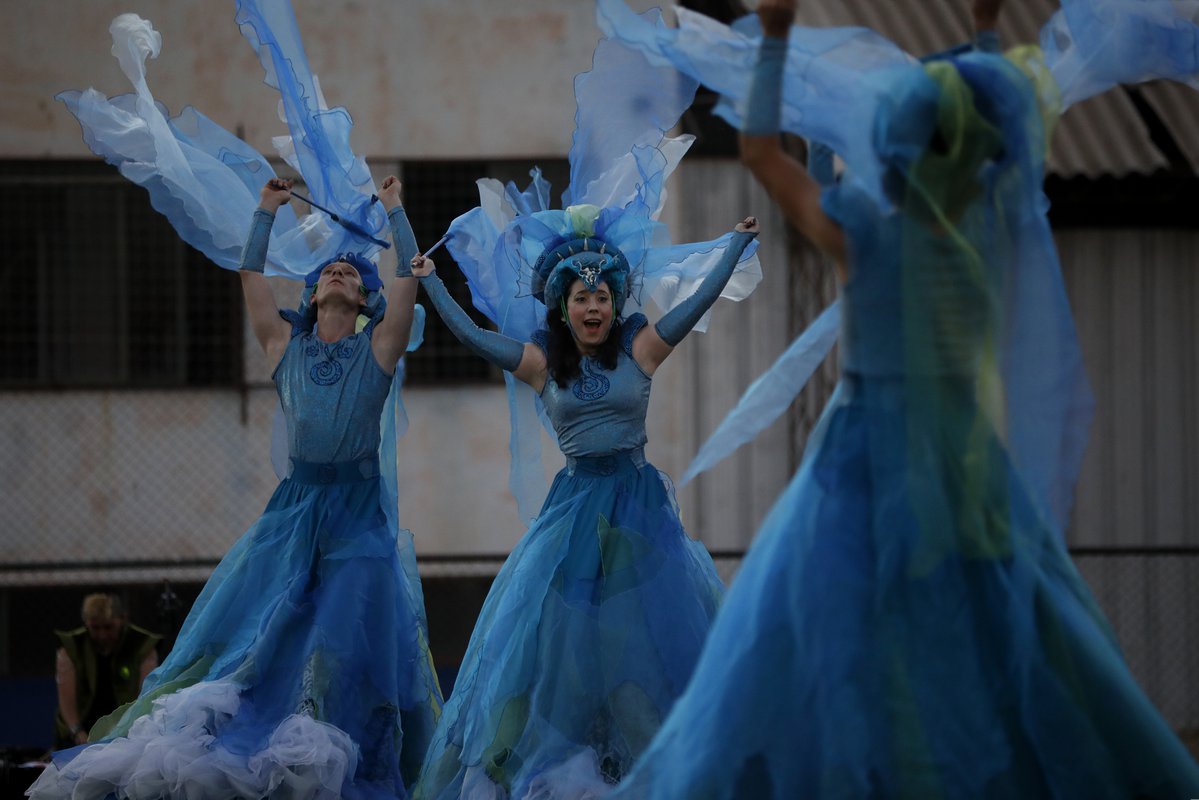Street Theater
Original idea and director: Horacio Videla | Cast: Pamela Guzmán, Álvaro Pizarro, Natalia Mora, Andrea Escobar, Diego Pezo, German Díaz, Úrsula Campos, Alejandro Contreras | Singer: Petronila Villacura | Sound technician: Diego Elgueta | Stagehand/technician: Alexis Erpel.
Horacio Videla
Director
Never off the streets
This theater director has had a career spanning many years, both in traditional venues as well as in public interventions, with his work characterized, among other things, by his efforts at cultural decentralization, specifically through country-wide tours of different shows. He was a founding member of Gran Circo Teatro and acted in the legendary play La negra Ester, directed by Andrés Pérez. In 2007, he founded Teatroonirus, a company with which he’s premiered more than 18 shows to date, including Altazor pasajero de su destino (2010), winner of a Fondart Bicentenary grant and Tito Andrónico, un Shakespeare en espacio público (2017). He directed the street version of the Santiago a Mil Festival’s opening ceremony in 2019 and he’s been a member of the jury for the Las Condes Theater Festival since 2012.
Teatroonirus
Teatroonirus
On a large-scale
This company is dedicated to researching different forms of expression for theater in public. They divide their work into four different areas: interventions in public as a place for art and culture, holding large-scale street shows; an interest in corporality; the physical work of actors and the multiple variations of this and an inclination towards fantasy as a metaphysical form of expression and of an ongoing search for theatrical styles. They’ve premiered 18 shows and carried out numerous artistic performances since 2007.
»(Teatroonirus is a ) company that’s defined by the quality of its moving structures, costumes, make-up and music”.
—Bío Bío Radio
—Teatroonirus is one of the most important street theater companies in Chile, together with companies like La Patogallina and La Patriótico Interesante. All the pieces Horacio Videla directs have public places in mind, even when they’re created for traditional venues: the group thinks big while keeping its feet on the ground.
—The play brings all the ingredients of a street theater production to the table, such as direct action, visuals and corporality to describe the journey of the little girl ILA through different natural states, involving birds, forests and the sea. All these lend themselves perfectly to this company’s kind of theater.
—Teatroonirus’ street theater doesn’t underestimate children and is made with them in mind. It tackles a universal issue that is more visible to their generation than the ones before it.
Street theater: A form of theater that is held outside in public, where the audience doesn’t pay to watch the show and normally comes across it by chance. It dates back to ancient Greece around the VI century A.C. In modern times, it was revived as a result of a downturn in conventional theater venues, looking to appeal to an audience that didn’t go to the theater in an act of socio-political rebellion. This ideological aspect meant that, during the first half of the twentieth century, it was associated with the working-class. From the sixties onwards, it gradually became more esthetic than political and, in the nineties, it started to incorporate more lighting, sound and special effects.
—Watch the documentary Más cerca de la luz by Martín Farías about the emergence and growth of street theater in Santiago.
—Watch the creative process of four companies - including Teatroonirus - in the Santiago a Mil 2017 production, Tito Andrónico.
On Instagram, @teatroonirus
On Facebook, teatro.onirus
PRODUCE

Gea, una oda a la naturaleza
By Teatroonirus | Directed by Horacio Videla
- Chile
- Spanish
- 45 minutes
Inspired by the spirit of the earth, a little girl embarks on a long journey to try and put an end to environmental destruction and encourage us to treat the planet as the living thing that it is.
Gea, una oda a la naturaleza is a street theater piece that uses corporality to highlight the importance, fragility and beauty of nature. Large-scale characters, actors, singers and acrobats bring this contemporary fable to life, inspiring us to communicate with the earth as a living thing and not just treat it as a resource.
In a dream, ILA - a child of today - sees the world of the future, in which the environment has already been destroyed. Upset by this vision and spurred on by Gea (the spirit of the earth), she decides to go on a journey through different natural states to win more time and try and revert this situation.
Gea, una oda a la naturaleza
By Teatroonirus | Directed by Horacio Videla
- Chile
- Spanish
- 45 minutes
Inspired by the spirit of the earth, a little girl embarks on a long journey to try and put an end to environmental destruction and encourage us to treat the planet as the living thing that it is.
Gea, una oda a la naturaleza is a street theater piece that uses corporality to highlight the importance, fragility and beauty of nature. Large-scale characters, actors, singers and acrobats bring this contemporary fable to life, inspiring us to communicate with the earth as a living thing and not just treat it as a resource.
In a dream, ILA - a child of today - sees the world of the future, in which the environment has already been destroyed. Upset by this vision and spurred on by Gea (the spirit of the earth), she decides to go on a journey through different natural states to win more time and try and revert this situation.
Original idea and director: Horacio Videla | Cast: Pamela Guzmán, Álvaro Pizarro, Natalia Mora, Andrea Escobar, Diego Pezo, German Díaz, Úrsula Campos, Alejandro Contreras | Singer: Petronila Villacura | Sound technician: Diego Elgueta | Stagehand/technician: Alexis Erpel.
Horacio Videla
Director
Never off the streets
This theater director has had a career spanning many years, both in traditional venues as well as in public interventions, with his work characterized, among other things, by his efforts at cultural decentralization, specifically through country-wide tours of different shows. He was a founding member of Gran Circo Teatro and acted in the legendary play La negra Ester, directed by Andrés Pérez. In 2007, he founded Teatroonirus, a company with which he’s premiered more than 18 shows to date, including Altazor pasajero de su destino (2010), winner of a Fondart Bicentenary grant and Tito Andrónico, un Shakespeare en espacio público (2017). He directed the street version of the Santiago a Mil Festival’s opening ceremony in 2019 and he’s been a member of the jury for the Las Condes Theater Festival since 2012.
Teatroonirus
Teatroonirus
On a large-scale
This company is dedicated to researching different forms of expression for theater in public. They divide their work into four different areas: interventions in public as a place for art and culture, holding large-scale street shows; an interest in corporality; the physical work of actors and the multiple variations of this and an inclination towards fantasy as a metaphysical form of expression and of an ongoing search for theatrical styles. They’ve premiered 18 shows and carried out numerous artistic performances since 2007.
»(Teatroonirus is a ) company that’s defined by the quality of its moving structures, costumes, make-up and music”.
—Bío Bío Radio
—Teatroonirus is one of the most important street theater companies in Chile, together with companies like La Patogallina and La Patriótico Interesante. All the pieces Horacio Videla directs have public places in mind, even when they’re created for traditional venues: the group thinks big while keeping its feet on the ground.
—The play brings all the ingredients of a street theater production to the table, such as direct action, visuals and corporality to describe the journey of the little girl ILA through different natural states, involving birds, forests and the sea. All these lend themselves perfectly to this company’s kind of theater.
—Teatroonirus’ street theater doesn’t underestimate children and is made with them in mind. It tackles a universal issue that is more visible to their generation than the ones before it.
Street theater: A form of theater that is held outside in public, where the audience doesn’t pay to watch the show and normally comes across it by chance. It dates back to ancient Greece around the VI century A.C. In modern times, it was revived as a result of a downturn in conventional theater venues, looking to appeal to an audience that didn’t go to the theater in an act of socio-political rebellion. This ideological aspect meant that, during the first half of the twentieth century, it was associated with the working-class. From the sixties onwards, it gradually became more esthetic than political and, in the nineties, it started to incorporate more lighting, sound and special effects.
—Watch the documentary Más cerca de la luz by Martín Farías about the emergence and growth of street theater in Santiago.
—Watch the creative process of four companies - including Teatroonirus - in the Santiago a Mil 2017 production, Tito Andrónico.
On Instagram, @teatroonirus
On Facebook, teatro.onirus
PRODUCE




